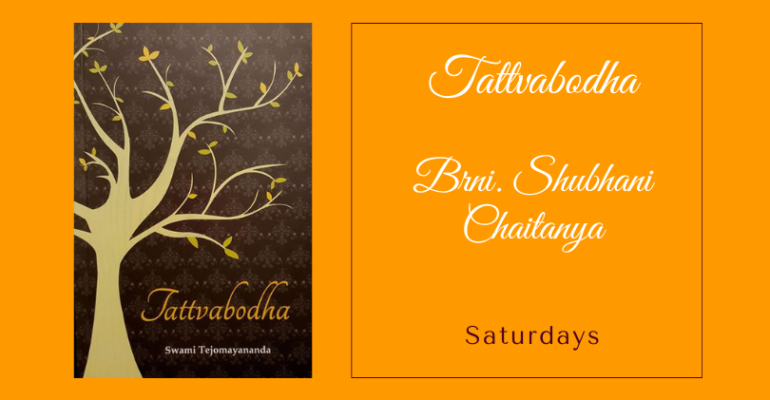Podcast on Spotify
Conclusion of the four qualities of a seeker
एतत् साधनचतुष्टयम् ।
ततस्तत्त्वविवेकस्याधिकारिणो भवन्ति ।
tatastattvavivekasyādhikāriṇo bhavanti.
Here, the section of the four qualities of a seeker conclude by asserting that only through acquiring these qualities can we become qualified seekers. We have to study the scripture and also study our minds, so that we can continue to introspect and become better seekers.
What is inquiry into the Truth?
तत्त्वविवेकः कः ?
आत्मा सत्यं तदन्यत् सर्वं मिथ्येति ।
tattvavivekaḥ kaḥ ?
ātmā satyaṃ tadanyat sarvaṃ mithyeti.
Inquiry into the Truth is defined as: the Self is real and other than that, everything is unreal. First, let us understand the definition of what is real.
Two definitions of reality
That which remains changeless all throughout 3 periods of time – waking, dream and deep sleep. Our bodies keep changing, minds keep changing, personalities keep changing. All of these changing entities are mithyā (unreal) because they keep changing. The true “I” is that Self or Saccidānanda.
That which cannot be negated or abādhita. When we are in flow or in deep sleep, we have no experience of our body – it is negated. Similarly, when we are in flow or in deep sleep, the mind is also negated. That “I” which cannot be negated is real, it is the Self or ātmā.
Anything which does not come under this definition is mithyā, it is unreal.
What is the Self?
आत्मा कः ?
स्थूलसूक्ष्मकारणशरीराद्व्यतिरिक्तः पञ्चकोशातीतः सन्
अवस्थात्रयसाक्षी सच्चिदानन्दस्वरूपः सन्
यस्तिष्ठति स आत्मा ।
ātmā kaḥ ?
sthūlasūkṣmakāraṇaśarīrādvyatiriktaḥ pañcakośātītaḥ san
avasthātrayasākṣī saccidānandasvarūpaḥ san
yastiṣṭhati sa ātmā.
Definitions of the Self
The Self is different from the three bodies: gross body, subtle body and causal body.
The Self is beyond the five sheaths: food sheath, vital air sheath, mental sheath, intellectual sheath, bliss sheath.
The Self is the witness of the three states: waking state, dream state, deep sleep state.
The Self is of the nature of Saccidānanda or Existence-Consciousness-Bliss.
What is the gross body?
स्थूलशरीरं किम् ?
पञ्चीकृतपञ्चमहाभूतैः कृतं सत्कर्मजन्यं
सुखदुःखादिभोगायतनं शरीरम्
अस्ति जायते वर्धते विपरिणमते अपक्षीयते विनश्यतीति
षड्विकारवदेतत्स्थूलशरीरम् ।
sthūlaśarīraṃ kim ?
pañcīkṛtapañcamahābhūtaiḥ kṛtaṃ satkarmajanyaṃ
sukhaduḥkhādibhogāyatanaṃ śarīram
asti jāyate vardhate vipariṇamate apakṣīyate vinaśyatīti
ṣaḍvikāravadetatsthūlaśarīram .
The body is defined as śarīra, that which decays. The gross body is called as such because it is perceived by the senses.
Characteristics of the gross body
Material cause: The gross body is made of five grossified elements: space, air, fire, water and earth.
Efficient cause: The gross body is created as a result of our good karmas.
Function of our body: It is a counter for experience, for interacting with the world.
The body is subject to six modifications: It exists, it is born, it grows, it matures, it decays, it gets destroyed.
Reasons why the Self not the body
This body is changing but the Self is changeless.
This body is seen but the Self is the seer.
This body is inert, it is an object of experience, while the Self is awareness.
Our scriptures say that the gross body is a divine tool to realize the Self. But by obsessing about the gross body, we identify with issues such as race, gender, height, weight, culture and tradition. These obsessions prevent us from introspection and understanding who we really are. Therefore we should take care of our body so that we can serve the world. But we should not obsess over the body.

